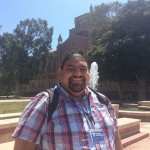For Donald Salcedo, a member of the Quechan Indian tribe, pursuing a spot at UCLA meant choosing between personal achievement and serving his community.
Salcedo, a fourth-year American Indian studies student, is one of four California Native American students to win the Rodney T. Mathews, Jr. Memorial Scholarship, a $10,000 prize the Morongo Band of Mission Indians has awarded to select California Native American students for the past 14 years. The tribe has awarded $470,000 in scholarships to Native American students since the scholarship was established, said Michael Fisher, a representative for the Morongo Band of Mission Indians.
Salcedo had worked for eight years as a tribal social worker, mostly in Los Angeles County. At the same time, Salcedo was taking courses at his local community college.
“It just felt more important at the time to work and help my community than help myself in college,” Salcedo said. “It was very hard to leave my community to come back to do something as selfish as get an education.”
Morongo Tribal Chairman Robert Martin said in a news release that the purpose of the award was to improve the representation of Native American groups in higher education.
“The Rodney T. Mathews, Jr. Scholarship at Morongo was created to reverse the trends that have left Native Americans as the most underrepresented group in colleges and universities,” Martin said. “We are happy to be supporting each of this year’s deserving recipients in attaining the education and skills they need to pursue their goals and improve their tribal communities.”
Salcedo said he vividly remembers feeling overcome with emotion when he got the call that he’d received the award. Salcedo said he asked the caller whether he would received the whole $10,000.
“(The caller) was like, ‘Yeah, it’s just for you, we awarded four of these scholarships throughout the state, and we’re so proud of you.’ And I was just bawling on the phone,” he said.
Last year, Salcedo was working two jobs at UCLA to make ends meet. Salcedo said he was willing to do whatever it took to stay at UCLA and beat the odds that were stacked against him, particularly as a first-generation college student.
“My mom didn’t graduate high school, she only went to junior high, and she said, ‘Do you think you’re going to be able to learn like them?’” Salcedo said. “I saw my parents doubt, you know, in themselves, and the doubt that – I think that parents have huge dreams for their children, and for me, I’m living the dream that my parents didn’t know that they could dream.”
Before transferring to UCLA, Salcedo helped develop the first American Indian support group at UCLA in 2009, and performed songs from his tribal community at UCLA.
Theresa Ambo, a postdoctoral researcher at UC San Diego, co-ran the support group with Salcedo. Ambo said Salcedo was heavily invested in helping his community.
“I would say (Salcedo is) really relentless, … very dedicated, selfless. I think that he is committed to ensuring the prosperity of American Indian people, particularly in LA County, which is where he grew up,” Ambo said.
Salcedo first made the decision to apply to UCLA while attending a Summer Intensive Transfer Experience for Native American and Pacific Islander students, under the UCLA Center for Community College Partnerships. Salcedo said being on campus helped him realize that higher education was an attainable goal.
“When I experienced the program, and seeing how I wanted to be a Bruin, I just felt this drive,” Salcedo said.
For Salcedo, the urge to support the most in-need members of his already underserved community took priority over his educational goals. Salcedo’s residence in LA County put him in a unique position to serve – the county has more American Indians than any other in the nation, according to the UCLA American Indian Studies Center.
Salcedo worked for Southern California tribes other than his own, working directly with community members in pressing areas such as child welfare, adoption, mental health, elder abuse and domestic violence.
“One of the communities I was working for, in one year we had seven deaths. Seven community members died during the year from different, nonhealth-related, nonnatural deaths,” Salcedo said. “Car accidents, suicides, homicide, things like that.”
He said he felt the slow pace of community college was distracting him from the urgent responsibilities of his job.
“In a community college sometimes you feel like it’s pointless, you don’t feel like you’re going to get anywhere,” he said. “I never dreamed that I could take what I was learning in my community college and apply it at UCLA.”
The Rodney T. Mathews, Jr. scholarship will allow Salcedo to pursue an advanced degree in social work, on top of a Bachelor of Arts in American Indian studies, without having to worry about finances.
“My community needed strong social workers, strong mental health workers, strong community workers, and so I couldn’t facilitate the needs of my community without having that education,” Salcedo said.
In the beginning of November, Salcedo attended a pep rally at a Morongo school to speak about the importance of education. Salcedo said it was encouraging to see the next generation of American Indian students receive the educational support they need.
“I’m from a Southern California tribe, I’ve worked in that area with tribe members from Morongo and other surrounding areas,” he said. “Seeing so many young people there, and just seeing our future and seeing them excited, … it makes me excited for our community.”
